Targeting REGNASE-1 programs long-lived effector T cells for cancer therapy
- PMID: 31827283
- PMCID: PMC6937596
- DOI: 10.1038/s41586-019-1821-z
Targeting REGNASE-1 programs long-lived effector T cells for cancer therapy
Abstract
Adoptive cell therapy represents a new paradigm in cancer immunotherapy, but it can be limited by the poor persistence and function of transferred T cells1. Here we use an in vivo pooled CRISPR-Cas9 mutagenesis screening approach to demonstrate that, by targeting REGNASE-1, CD8+ T cells are reprogrammed to long-lived effector cells with extensive accumulation, better persistence and robust effector function in tumours. REGNASE-1-deficient CD8+ T cells show markedly improved therapeutic efficacy against mouse models of melanoma and leukaemia. By using a secondary genome-scale CRISPR-Cas9 screening, we identify BATF as the key target of REGNASE-1 and as a rheostat that shapes antitumour responses. Loss of BATF suppresses the increased accumulation and mitochondrial fitness of REGNASE-1-deficient CD8+ T cells. By contrast, the targeting of additional signalling factors-including PTPN2 and SOCS1-improves the therapeutic efficacy of REGNASE-1-deficient CD8+ T cells. Our findings suggest that T cell persistence and effector function can be coordinated in tumour immunity and point to avenues for improving the efficacy of adoptive cell therapy for cancer.
Conflict of interest statement
Competing interests
H.C. and J.W. are authors of a patent application related to Regnase-1 and BATF.
Figures
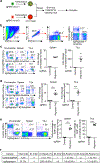
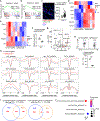

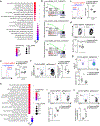
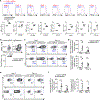

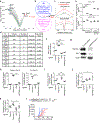


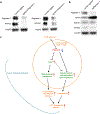





Comment in
-
Antitumour T cells stand the test of time.Nature. 2019 Dec;576(7787):392-393. doi: 10.1038/d41586-019-03731-w. Nature. 2019. PMID: 31844255 No abstract available.
References
Publication types
MeSH terms
Substances
Grants and funding
- AI140761/NH/NIH HHS/United States
- R01 AI131703/AI/NIAID NIH HHS/United States
- CA221290/NH/NIH HHS/United States
- AI150241/NH/NIH HHS/United States
- R01 AI150514/AI/NIAID NIH HHS/United States
- AI131703/NH/NIH HHS/United States
- R37 AI105887/AI/NIAID NIH HHS/United States
- AI105887/NH/NIH HHS/United States
- R01 CA176624/CA/NCI NIH HHS/United States
- R01 AI140761/AI/NIAID NIH HHS/United States
- R01 AI105887/AI/NIAID NIH HHS/United States
- AI150514/NH/NIH HHS/United States
- R01 CA221290/CA/NCI NIH HHS/United States
- R01 GM134382/GM/NIGMS NIH HHS/United States
- R01 AI150241/AI/NIAID NIH HHS/United States
LinkOut - more resources
Full Text Sources
Other Literature Sources
Medical
Molecular Biology Databases
Research Materials

